Sunday Night Environmental Group (SNEG) has asked Middlebury College to re-evaluate its relationship with JP Morgan Chase Bank, the world’s largest funder of fossil fuels. Chase continues to fund new fossil fuel investment at a time when the global climate crisis is worsening. As student activists, we question the college’s reliance on Chase Bank in the wake of the principled commitments made to renewable energy in Energy 2028. Middlebury College relies on JP Morgan Chase for a sector of its day-to-day financial operations and utilizes Chase for its purchasing cards (p-cards), a form of payment hardware intended to facilitate transactions for large institutions. SNEG is actively exploring sustainable finance courses of action that align with the college’s environmental values.
Chase Bank is the world’s worst contributor to fossil fuel investment, funneling over $51.3 billion into the fossil fuel industry in 2021 alone. From 2016 to 2020, Chase provided a total of over $317 billion — 33% more than the next-largest contributor, Citibank, which spent a total of $237 billion between 2016 and 2021. Wells Fargo and Bank of America followed closely behind. Furthermore, and by an even wider margin, Chase is the leading lender to the top 100 companies actively expanding fossil fuels. Chase also boasts a diversified portfolio as the number one banker in many sub-sectors of the industry, including tar sands, arctic, and ultra-deepwater oil and gas infrastructure along with fracking and coal mining. When asked this past September about ending funding for new oil and gas, Chase CEO Jamie Dimon declared, “Absolutely not and that would be the road to hell for America.” Scientists have agreed that we direly need to stay beneath the 1.5℃ threshold for global atmospheric temperature warming. New fossil fuel infrastructure sends us in the wrong direction at a time where there may be no turning back.
These investments have human costs. A 2019 report from the Rainforest Action Network, a U.S.-based nonprofit organization working to create environmental policy, challenge corporate power, and protect human rights, outlined some of the troubling linkages between Chase’s fossil fuel investments and human rights violations. JP Morgan Chase has invested in oil and mining companies operating in the Amazon rainforest. These companies drill for oil on the sovereign land of indigenous peoples without their consent. Such extractive activities have resulted in contamination and health impacts, the deforestation of a diverse biome and critical carbon sink and the violation of indigenous rights. These companies plan to expand their drilling operations, and Chase remains a committed shareholder.
Chase’s morally-questionable investments have also been linked to another significant global development: the Russian invasion of Ukraine. Between 2016 and 2020, Chase Bank was the largest global banker of Gazprom, the largest Russian state-owned oil and gas company, allocating roughly $3.5 billion in funds. Of all U.S. companies, Chase provided the largest combination of credit and investment to what financial experts call Russian “carbon bombs,” new extraction projects with the capacity to emit carbon in excess of more than one billion tonnes. These fossil fuel investments indirectly fund Russia’s invasion of Ukraine. Ten months into the war, Chase remains Gazprom’s biggest funder, and they need to be held accountable.
Through their investments in fossil fuels, banks play a large role in creating the climate crisis, and wealthy U.S. banks are the biggest culprits. A critical first step in curbing climate change and initiating drawdown is stopping extractive energy practices that spew carbon dioxide into the atmosphere. We need to hold big banks accountable and push them to cease funding for an industry we cannot survive supporting. After reviewing a collection of scientific literature on climate change, even U.K.-based JP Morgan economists David Mackie and Jessica Murray concluded that if emissions are not cut, “catastrophic outcomes” will undoubtedly result. Yet, like many big banks that are lured by the promise of continued profits, JP Morgan Chase bank has not significantly changed course. This needs to stop.
Institutions and individuals that utilize these banks for their financial operations implicitly support these environmentally-destructive investments. Through collective action, this support can be withdrawn. Climate activism focusing on big banks targets the fossil fuel industry’s unyielding need for new capital. The theory is that pressure on banks to make financing oil and gas less profitable — and moreover, socially unacceptable — could boost investments in renewable energy by destabilizing and decreasing funds for dirty energy, thus making such energy sources economically infeasible. Banks have power. They have the power to fund our future, yet JP Morgan Chase funds the climate crisis. All across the globe, people are protesting Chase, and our college, a known leader in sustainability, has the opportunity to join the effort.
Last Friday, SNEG representatives Birch Banks, Ninive Carmen Calegari, Kate Goodman, Charlotte Lawrence and Lillian Prime met with Executive Vice President of Finance and Administration David Provost, Director of Investments and Treasury Operations Derek Hammel and Associate Vice President for Finance Alberto Citarella to discuss switching to a new financial institution. SNEG has a strong history of partnership with the administration to implement change on campus that dates back to the successful divestment of the endowment.
Roughly $60 million lies in Middlebury’s p-card accounts with Chase, which was discussed during the meeting. The school’s contract with Chase is part of a larger financial agreement among St. Michael’s College, Champlain College and Middlebury (collectively known as the Green Mountain Higher Education Consortium). Every p-card attached to a college van, every card checked out for student organization purchases and every department card is a JP Morgan Chase Bank card. The use of Chase Bank cards also extends to Middlebury’s schools abroad and the Middlebury Institute of International Studies at Monterey. Thus, every dollar in Middlebury’s p-card accounts supports Chase Bank’s practice of investing in fossil fuels.
The administrators showed enthusiasm for the campaign and a willingness to consider other banking options for the school’s p-card contract, emphasizing the importance of finding a large replacement firm with the infrastructure to handle money efficiently. The p-card contract with Chase is due for renewal in January of 2025, meaning that renegotiations need to occur in mid-2024 at the latest. In the coming months, SNEG is excited to continue pursuing their Dump Chase campaign and will research alternative banks to present to Middlebury’s financial administration.
The Sunday Night Environmental Group (SNEG) is a non-hierarchical student organization committed to climate and social justice activism. We strive to ground our work in anti-racism, indigenous sovereignty and community power. We meet Sunday nights at 8 p.m. in Hillcrest 103. All are welcome regardless of prior knowledge or experience. More information at go/dumpchase.




